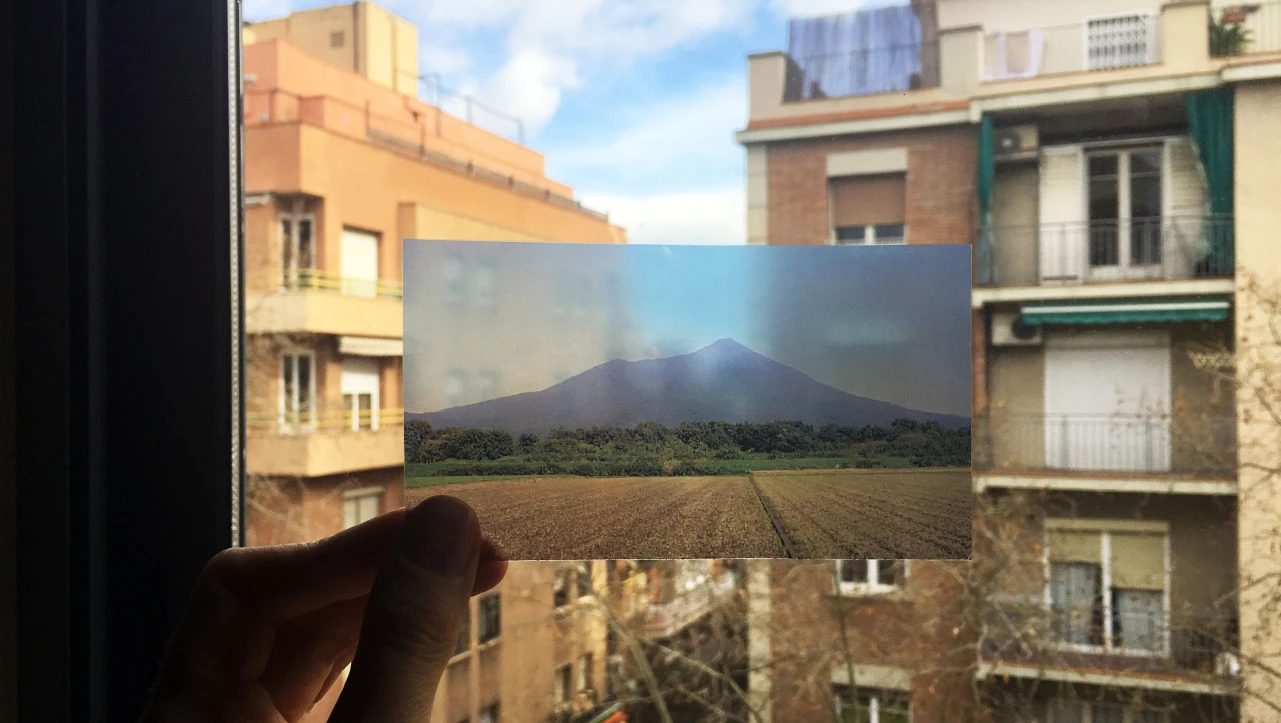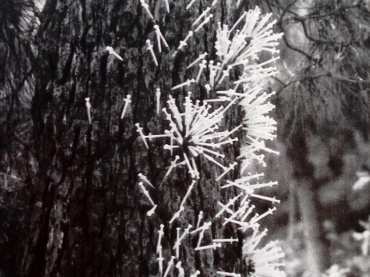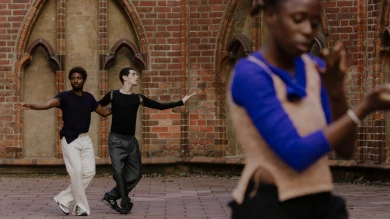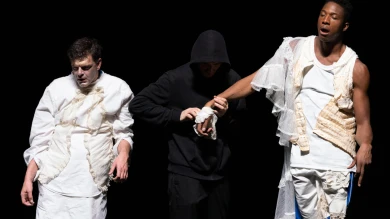Collective Mourning and Planetary Mourning

Held on 11 Nov 2022
Collective Mourning and Planetary Mourning is the title under which a set of activities are set in motion around the echo of activities celebrating All Souls Day with a programme of live arts, before continuing with a study group under the same name. It seeks to open up a dialogue around mourning as a human process of loss and mourning established by the world through reflections from artistic forms of expression, social movements and environmental activism.
The helplessness experienced in the death of thousands of people during the recent global pandemic, in addition to successive and current wars, exists alongside a growing sadness over environmental collapse and the destruction of life on Earth. In this context of social disturbance, forms of rituality and collective care arise, inviting us to reflect on the power of mourning to reshape relationships with the world.
In contemporary Western societies there is the prevailing conception of mourning as the process an individual must go through after the loss of affective ties to those who have passed. This acceptance, imposed as work based on the exercise of forgetting, is revised by Vinciane Despret in her book Our Grateful Dead. Stories of Those Left Behind (University of Minnesota Press, 2021). In it, Despret gathers the testimonies of lived experiences during mourning, and suggests we listen and tend to other forms of existence in our relationships with those who are no longer here. Gestures, behaviours and unusual attentions that can lead to mourning not being conceived negatively as an anomaly that we must cure ourselves of, but as a state which is able to perceive and house modes of uncommon co-existence between people, times, spaces and beings.
[dropdown]
Drawing inspiration from these ideas, the programme starts by setting forth a critical questioning of the conception of mourning as individual experience, addressing the collectiveness of life and the conditions and categorisation of the sick body. It prompts a study of present issues in situated ecologies — for instance analogies between ways of life — so as to observe the tensions or conflicts that stem from them. The question around whether it is possible, as a society, to imagine and put into practice gestures that nurture a more just co-existence between humans and other species — animals, plants and minerals — and which also dissociate themselves from the established relations of consumption, destruction or domination, form the backbone of the overall intention of Collective Mourning and Planetary Mourning.
Collective Mourning and Planetary Mourning’s live arts programme is held in collaboration with the Community of Madrid’s 40th Autumn Festival and features the screening of the stage piece MONUMENT 0.6: Heterochrony, by Eszter Salamon, and the performance of Alex Baczyński-Jenkins’s dance piece Unending love, or love dies, on repeat like it’s endless. The project occasions experimentation with a sensitive approach to choreographic pieces and other physical practices which contend with different states of transit between life and death: the multiple and complex forms of mutual care; support for different states of mind stemming from loss; the invention of our own corporal or symbolic ritualisms which, upon being shared, resignify and establish new relational forms with life; and, finally, mourning as a state for perception and listening.
Furthermore, the Museo’s study group is articulated around six sessions grouped into two blocks, whereby artists and researchers who work in different fields of knowledge — Alejandro Alonso Díaz, Marwa Arsanios, Rebecca Collins, María García Ruiz, Germán Labrador, José Antonio Sánchez, Alejandro Simón and Leire Vergara — are invited to share their investigations, readings, experiences and artworks, with the aim of cultivating a terrain of reflection and debate around mourning. It also follows on from the study groups previously coordinated by the research group Artea — Body, Territory and Conflict (2020–2021) and Conjugating Worlds: Multi-Species Corporealities (2022) — and is linked to the research project The New Loss of Centre. Critical Practices of Live Arts and Architecture in the Anthropocene, directed by Fernando Quesada, from the University of Alcalá de Henares, and funded by Spain’s Ministry of Science and Innovation.
[/dropdown]
Curator
Isabel de Naverán (ARTEA)
Organised by
Museo Reina Sofía
Collaboration
The Community of Madrid’s Autumn Festival
Inside the framework of
TIZ 5. Phantasmata and TIZ 6. Planet A: Green World
-
Friday, 11 November 2022 Nouvel Building, Auditorium 200
Collective Mourning and Planetary Mourning. MONUMENT 0.6: Heterochrony
Eszter Salamon
TicketsThe Museo organises Collective Mourning and Planetary Mourning, with a live arts programme which participates in the 40th Autumn Festival of Madrid. The first part features the performance of MONUMENT 0.6: Heterochrony, a stage piece by Hungarian choreographer Eszter Salamon, who creates an imaginary scene between past and present. The work also includes echoes of music archives from Sicily with choreographic impressions inspired by the mummification rituals of the Capuchin Catacombs of Palermo, presenting a continuum between life and death, a phantasmagorical co-existence, while inventing its own utopian body: a dancing, acoustic body. The performance is followed by a conversation between Eszter Salamon, Isabel de Naverán, Germán Labrador and Alberto Conejero.

-
Saturday, 12, and Sunday, 13 November 2022 Sabatini Building, Floor 1, Room 102
Collective Mourning and Planetary Mourning. Unending love, or love dies, on repeat like it's endless
Alex Baczyński-Jenkins
TicketsThe second part of the Collective Mourning and Planetary Mourning programme presents the performance Unending love or love dies, on repeat like it's endless, a choreography by Alex Baczyński-Jenkins which explores relationships between desire, dance, fragmentation, love (understood as communality), mourning and time. Through the gesture, sensuality, relationality and touch, Baczyński-Jenkins’s practice unfurls structures and politics of desire. Relationality is present in the dialogic forms of developing and performing the piece, and in the materials and poetics it invokes. This includes the study of the relationships between feeling and sociability, embodied expression and alienation, the textures of daily experiences and latent queer utopian legacies.

-
20 December 2022 - 26 January 2023
Collective Mourning and Planetary Mourning
Study Group
RegistrationThis study group ties in with the same-titled live arts programme. Across six sessions, artists and researchers share their investigations, readings, experiences and artistic references, contributing to an enrichment of reflections and debates which set up a dialogue with mourning a process of human loss and the mourning engendered by the gradual destruction of the planet. In this context of social disturbance, forms of rituality and collective care arise, inviting us to reflect on the potential of mourning to reshape relationships with the world.

Más actividades

Difficulty. Forms and Political Effects of Deviation in Writing and Contemporary Art
23 February – 14 December 2026 – Check programme
Difficulty. Forms and Political Effects of Deviation in Writing and Contemporary Art is a study group aligned towards thinking about how certain contemporary artistic and cultural practices resist the referentiality that dominates the logics of production and the consumption of present-day art. At the centre of this proposal are the concepts of difficulty and deviation, under which it brings together any procedure capable of preventing artistic forms from being absorbed by a meaning that appears previous to and independent from its expression. By ensuring the perceptibility of their languages, difficulty invites us to think of meaning as the effect of a signifying tension; that is, as a productive and creative activity which, from the materiality of art objects, frees aesthetic experience from the representational mandate and those who participate in it from the passiveness associated with tasks of mimesis and decoding.
The economy of the referential norm translates the social logic of capitalism, where insidious forms of capturing subjectivity and meaning operate. In the early 1980s, and adopting a Marxist framework, poet Ron Silliman highlighted how this logic entailed separating language from any mark, gesture, script, form or syntax that might link it to the conditions of its production, rendering it fetichised (as if without a subject) and alienating its users in a use for which they are not responsible. This double dispossession encodes the political strategy of referential objectivity: with no subject and no trace of its own consistency, language is merely an object, that reality in which it disappears.
The political uses of referentiality, more sophisticated today than ever before, sustain the neoliberal-extractivist phase of capitalism that crosses through present-day societies politically, economically and aesthetically. Against them, fugitive artistic practices emerge which, drawing from Black and Queer studies and other subaltern critical positions, reject the objective limits of what exists, invent forms to name what lies outside what has already been named, and return to subjects the capacity to participate in processes of emission and interpretation.
Read from the standpoint of artistic work, the objective capture of referentiality may be called transparency. Viewed from a social contract that reproduces inequality in fixed identity positions, transparent in this objectivity are, precisely, the discourses that maintain the status quo of domination. Opposite the inferno of these discourses, this group aims to collectively explore, through deviant or fugitive works, the paradise of language that Monique Wittig encountered in the estranged practices of literature. For the political potency of difficulty — that is, its contribution to the utopia of a free language among equals — depends on making visible, first, its own deviations; from there, the norm that those deviations transgress; and finally, the narrowness of a norm which in no way exhausts the possibilities ofsaying, signifying, referring and producing a world.
From this denouncement of referential alienation, fetishisation and capture, Difficulty. Forms and Political Effects of Deviation in Writing and Contemporary Art turns its attention to the strategies of resistance deployed by contemporary artists and poets. Its interest is directed towards proposals as evidently difficult or evasive as those of Gertrude Stein, Lyn Hejinian, Theresa Hak Kyung Cha, Kameelah Janan Rasheed, Kathy Acker, María Salgado and Ricardo Carreira, and as seemingly simple as those of Fernanda Laguna, Felix Gonzalez Torres and Cecilia Vicuña, among other examples that can be added according to the desires and dynamics of the group.
The ten study group sessions, held between February and December, combine theoretical seminars, work with artworks from the Museo Reina Sofía’s Collections and exhibitions, reading workshops and public programs. All these formats serve as spaces of encounter to think commonly about certain problems of poetics — that is, certain political questions — of contemporary writing and art.
Difficulty. Forms and Political Effects of Deviation in Writing and Contemporary Art inaugurates the research line Goodbye, Representation, through which the Museo Reina Sofía’s Studies Directorship seeks to explore the emergence of contemporary artistic and cultural practices which move away from representation as a dominant aesthetic-political strategy and redirect their attention toward artistic languages that question the tendency to point, name and fix, advocating instead for fugitive aesthetics. Over its three-year duration, this research line materializes in study groups, seminars, screenings and other forms of public programming.

CLINIC 2628. A Community of Writing and Research in the Arts
February – October 2026
Clinic 2628 is a project which supports and brings together writings which stem from the intention to offer a space and sustainable time for research work in art and culture. Framed within an academic context which is increasingly less receptive to the forms in which thinking happens and is expressed, the aim is to rescue the academic from its neoliberal trappings and thus recover the alliance between precision and intuition, work and desire. A further goal is to return writing to a commons which makes this possible through the monitoring of processes and the collectivisation of ideas, stances, references and strategies.
The endeavour, rooted in a collaboration between the Museo Reina Sofía’s Studies Directorship and the Artea research group, via the i+D Experimenta project, is shaped by three annual editions conceived as spaces of experimentation, discussion and a demonstration of writings critical of what is put forward by today’s academia.
What forces, forms and processes are at play when writing about art and aesthetics? In academia, in museums and in other cultural institutions, the practice of writing is traversed by productivist logics which jeopardise rhythms of research and experimentation. The imposition of both scientism inherent in the structure of “the paper” and the quantifying of results which demand a criterion of quality and visibility sterilise and smoothen, from the outset, the coarseness that is particular to writing understood from the concrete part of language: phonic, graphic, syntactic and grammatical resistance connecting the language user to the community the language unites and activates. They also sterilise the roughness enmeshed in the same desire to write, the intuitive, clear and confusing pathways that once again connect the writer to those reading and writing, participating in a common good that is at once discovered and produced.
The progressive commercialisation of knowledge propelled by cognitive capitalism moves further away from the research and production of knowledge in artworks and artistic languages and practices. The work of curators and archive, criticism, performances and essays formerly saw a horizon of formal and emotional possibilities, of imagination that was much broader when not developed in circumstances of competition, indexing and impact. Today, would it be possible to regain, critically not nostalgically, these ways; namely, recovering by forms, and by written forms, the proximity between art thinking and its objects? How to write in another way, to another rhythm, with no more demands than those with which an artwork moves towards different ways of seeing, reading and being in the world?

Cultural Work
Thursday, 12 February 2026 – 5:30pm
This series is organised by equipoMotor, a group of teenagers, young people and older people who have participated in the Museo Reina Sofía’s previous community education projects, and is structured around four themed blocks that pivot on the monstrous.
Session number two looks to approach film as a place from which cultural work is made visible and processes of production engage in dialogue with artistic creation. From this premise, the session focuses on exploring how audiovisual content is produced, assembled and distributed, from the hands that handle the images to the bodies that participate in its circulation. The aim is to reflect on the invisible effort, precarity and forms of collaboration that uphold cultural life, that transform the filmic experience into an act that recognises and cares for common work.

Alberto Greco. Viva el arte vivo
Tuesday, 10 February 2026 – 7pm
In conjunction with the opening of the exhibition Alberto Greco. Viva el arte vivo, Fernando Davis, the show’s curator, and Amanda de la Garza, the Museo Reina Sofía’s deputy artist director, will converse in the Nouvel Building’s Auditorium 400 on the life and work of the Argentinian artist, a core figure in experimental avant-garde art.
The title of both exhibition and conversation originates from the proclamation “Long Live Arte Vivo” Alberto Greco (Buenos Aires, 1931— Barcelona, 1965) disseminated around the streets and on the walls of Rome. For Greco, arte vivo was an art of the future, an art based on a set of irreverent and untimely gestures, of adventures open to unpredictability melding with life, and which began in 1962, prior to his coining of the term “vivo-dito”. In his Manifiesto dito dell´arte vivo (Dito Arte-Vivo Manifesto), which he pasted on the walls of Genoa, Greco encouraged new contact “with the living elements of our reality: movement, time, people, conversations, smells, rumours, places, situations”. He would also burst into the everyday of Madrid’s streets as he convened a “vivo-dito moment”, culminating in the burning of a canvas painted collectively in Madrid’s Lavapiés neighbourhood.
In addition to founding arte vivo, Alberto Greco was an informalist painter, a queer flâneur, a poet and sometime actor. This intense journey of Greco’s life and art is closely connected to the migrant route he embarked upon in 1950 in Buenos Aires, taking in Atacama and Humahuaca, Paris, Rio de Janeiro, São Paulo, Genoa, Rome, Madrid, Piedralaves, New York and Ibiza and ending abruptly in Barcelona, where he took his own life shortly after writing his final great work, the novel Besos brujos (Bewitching Kisses, 1965).
These inaugural conversations, part of the main working strands of the Museo’s Public Programmes Area, aim to explore in greater depth the exhibition narratives of the shows organised by the Museo from the perspective of artists, curators and specialists.
![Basel Abbas y Ruanne Abou-Rahme, At Those Terrifying Frontiers Where the Existence and Disappearance of People Fade Into Each Other [En esas fronteras aterradoras donde la existencia y la desaparición de personas se disuelven entre sí], 2019](https://recursos.museoreinasofia.es/styles/small_landscape/public/Colecci%C3%B3n/abbasabourahme.png.webp)
Gaza and Aestheticide
Tuesday February 10, 2026 – 16:00 h
“This seminar examines the systematic destruction of Palestinian collective sensibility — what we might call ‛aestheticide’ — that has accompanied Israel’s genocide and ecocide in Gaza, and considers the conditions of artistic practice in its aftermath. Over more than two years, the demolition of universities, archives, museums, and libraries has not only erased cultural and intellectual infrastructure but has also targeted the very possibility of representation itself. The destruction of a people has been accompanied by the destruction of their image, their history, and their capacity to be known: reportage, scholarship, and cultural memory have been deliberately undermined, with media institutions, universities, and museums often complicit in this repression. Gaza consequently functions as a rehearsal space for a possible global future — of fascism, post-liberal authoritarianism, militarized borders, and AI-enabled warfare —, a laboratory for an emerging world order. What, then, becomes of critical analysis and resistance under these conditions? And what becomes of aesthetics and politics?”
—T.J. DemosThis seminar takes place thanks to the art historian’s invitation to Spain by the Miró Foundation. In the context of the museum, it engages in dialogue with a broader line of work on the climate emergency and decolonial perspectives developed within the Museum of the Commons project (2023–2026) of the L’Internationale network, of which the Museo Reina Sofía is a member; as well as with some of the questions that animate the study group Aesthetics of Peace and Desertion Tactics. Finally, it is also embedded in a wider strategy of support for and commitment to the artistic and discursive practices of Palestinian artists and cultural practitioners, most clearly reflected in the TEJA network.

